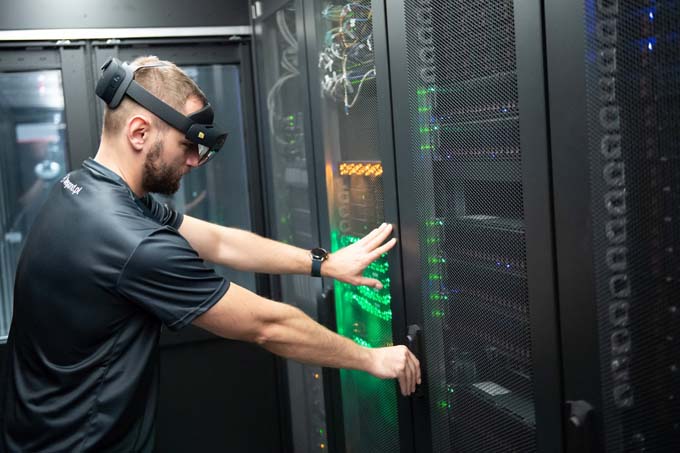How seriously is the data center industry taking ESG?
Digitization, the growth of Big Data, the expansion of remote working models and the further adaptation of the Internet of Things are leading to greater demand for new data centers. The total value of this market will reach $342 billion in the next 12 months, up 6.4 percent from 2022, according to Statista. And it will continue to grow, reaching an estimated $412 billion by 2027. But how is the data center industry doing on ESG issues? Comment.

Will the data center industry turn more and more to sustainable business? Wojciech Stramski, CEO of Beyond.pl, a Polish provider of sustainable data center and cloud services, comments on the issue situation as follows:
Those who do not save energy lose competitiveness
"Those who ignore sustainability policy and shy away from implementing it in their company lose their competitiveness. The demands on environmental management are increasing - from non-governmental organizations, the European Commission or ultimately from customers. For them, topics such as measuring the carbon footprint and energy efficiency, but also the protection of biodiversity and human rights, are just as important as the level of service, safety or server efficiency.
If the awareness of companies has not changed significantly as a result of the climate crisis, there is a good chance that this will be the case with the current energy crisis. Irresponsible digitization that ignores the principles of sustainability will lead to an irresponsible increase in resource consumption, including electricity consumption. Leveraging modern technologies such as 5G, IoT, AI or machine learning and working with proven and effectively managed partners using cutting-edge product and software solutions makes it possible to optimize energy consumption and sustainability.
Companies that have not been interested in solutions to reduce energy consumption have no choice now that various governments are announcing energy restrictions for businesses and rising prices. The users of the mentioned technologies should not only be companies from the IT sector, but also from the wider service sector, manufacturing or heavy industry.
Further reducing energy consumption not only in times of crisis
In a situation of limited energy supply, we must fight to reduce energy consumption. This is reflected in the data from a study published in October 2022. Study (Title: 'In Search of Optimization. Data centers, colocation and cloud'). This shows that, from a business perspective, increasing energy efficiency is seen as the best way to reduce energy costs and emissions. 61 percent of respondents from the largest Polish companies and corporations cited the rising costs of maintaining and upgrading their own data centers as an important motive for hosting IT resources in a professional data center or for cloud computing.
Changing customer requirements are forcing the IT industry to compete in the field of energy efficiency, the measure of which is the Power Usage Effectiveness (PUE) indicator. In 2021, its average value according to Uptime Institute at 1.57 PUE, which means that data centers consume on average 57 percent more energy to maintain the facilities' infrastructure than is required by the IT equipment operating within them. For enterprise server rooms, this ratio exceeds a value of 2.0 to 2.5.
The ideal, though still practically unattainable today, PUE value is 1.0 - in this case, the energy consumption of the data center would be equal to the demand of the IT equipment operated in it. Beyond.pl's data center has a PUE value of 1.2, making it one of the most energy-efficient facilities in Europe. In addition, the facilities have been powered by renewable energy since 2020.
The data center industry takes sustainability very seriously
The activities of the data center industry are also being noticed, and in 2022, for the first time in the twelve-year history of the European Green Week (EU Green Week), providers were given the opportunity to showcase their environmentally friendly activities. Numerous initiatives aimed at making cloud services and data centers more transparent, driving green change, and creating regulations are making the entire IT industry more sustainable.
These initiatives include the Pact for Climate-Neutral Data Centers or the Green Digital Coalition, whose membership includes Beyond.pl's requirements to power its facilities with 100 percent green energy, hold the ISO 14001 standard, and thus implement consistent measures that minimize the negative impact of its operations on the environment and contribute to sustainable business development.
What is forgotten when discussing the carbon footprint and environmental impact of technology is the fact that professional modern data centers achieve high resource savings, including electricity or water. Without modern data centers, the emission levels in the IT industry would be many times higher. Companies that choose to maintain their IT resources in their own server rooms are not able to provide the same level of optimization as larger facilities built specifically to maintain large IT environments.
Technology companies are not exempt from the challenges that all organizations face when it comes to employee diversity, equal pay for men and women, establishing stable foundations for corporate governance (organizational structure, business model, compliance with business ethics) or the environment. The challenges related to environmental, social and corporate governance (ESG) issues are all the more important for technology companies because the sector is characterized by relatively little regulation in this area.
Source reference:
- https://www.statista.com/outlook/tmo/data-center/worldwide
- https://www.computerworld.pl/news/W-poszukiwaniu-optymalizacji-Centra-danych-kolokacja-i-chmura,441821.html
- https://uptimeinstitute.com/about-ui/press-releases/uptime-institute-11th-annual-global-data-center-survey









